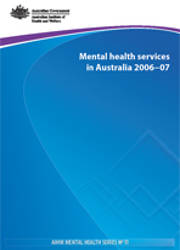Summary
The latest National Survey of Mental Health and Wellbeing conducted in 2007 by the Australian Bureau of Statistics (ABS 2008a) estimates that 3.2 million, or 20%, of the population had experienced symptoms of a mental disorder in the 12 months prior to the survey. This report on Australian mental health services provides detailed information on the national response to the mental health care needs of Australians using a range of AIHW and other data sources.
Service provision
- General practitioners (GPs) are often a first contact point for mental health concerns. In 2007–08, the BEACH survey estimated that over 11.9 million GP-patient encounters involved management of a mental health issue. These GP encounters increased by an annual average of 4.4% from 2003–04 to 2007–08.
- Medicare provides specific payments for some GP mental health-related encounters, such as the preparation or review of GP mental health care plans. These Medicare Benefits Schedule (MBS)-subsidised mental health items were introduced in November 2006. In 2006–07 there were nearly 550,000 claims against these items and in 2007–08 there were almost 1.2 million claims.
- In November 2006, the MBS was also extended to cover specific allied mental health services. In 2006–07 there were approximately 2.6 million claims for subsidised psychiatrist, psychologist and other allied health professional services and in 2007–08 there were 3.9 million claims.
- Community mental health services and hospital outpatient services also provide care for mental health consumers, with close to 6 million mental health-related service contacts in 2006–07, a 5.3% increase from 2005–06.
- Mental health care is provided to admitted patients in public acute, public psychiatric and private hospitals. In 2006–07, there were over 209,000 mental health-related separations for admitted patients. Over the 5 years to 2006–07, the average annual rate of increase for admitted patient mental health-related separations was 2.2%.
- In 2007–08, there were 20 million mental health-related prescriptions subsidised by the Pharmaceutical Benefits Scheme (and for veterans), accounting for just over one in ten of all prescription claims, costing over $700 million. Prescriptions for antipsychotics (49%) and antidepressants (43%) accounted for the majority of the spending.
Expenditure and resources
Expenditure on state and territory mental health services increased by an annual average of 5.6% (adjusted for inflation) between 2002–03 and 2006–07, to $3,040 million. Specialised psychiatric wards in public acute hospitals and community mental health care services experienced annual average increases in expenditure of 7.2% and 5.9%, respectively, while stand alone public psychiatric hospital expenditure remained relatively stable.



